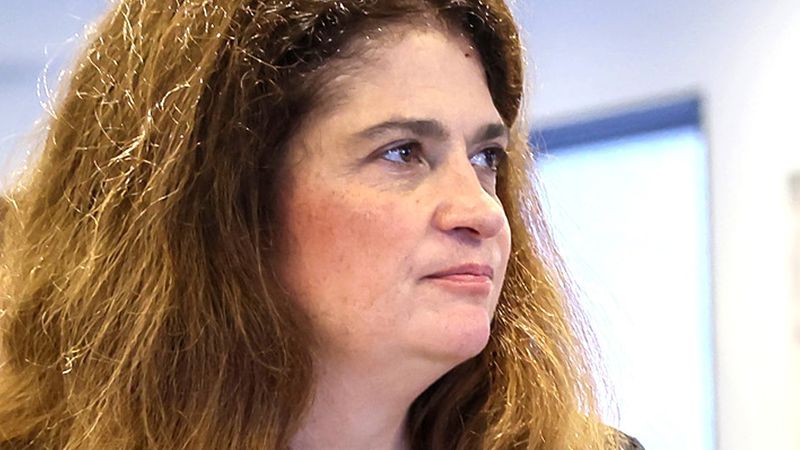18 Phrases A Woman Often Says To The Person She’s Falling Out Of Love With
In the intricate dance of relationships, subtle shifts in language often reveal underlying emotions. This blog post explores 18 phrases a woman might say when she’s quietly slipping away from love.
Each phrase carries with it a nuance of emotional distance or disconnection, gently peeling back the layers of a relationship that’s losing its grip. Through soft tones and sad reflections, we delve into the words that express a heart’s quiet retreat.
1. “I’m just tired, that’s all.”

When a woman says, “I’m just tired, that’s all,” it’s often more than mere fatigue. This phrase can signal emotional exhaustion, where the weight of unspoken disappointment accumulates over time. It’s a gentle way of expressing that things are wearing down.
Beyond the literal meaning, she might be hinting at a deeper sense of weariness in the relationship itself. The connection, once vibrant, now feels draining, like an energy that was once life-giving but has become burdensome.
She might avoid confrontation, preferring to mask her true feelings behind the guise of tiredness. This phrase becomes a quiet plea for understanding, a soft echo of the emotional distance she cannot articulate. It’s a moment where she hopes her partner sees beyond the words, understanding the quiet call for empathy and change.
2. “Can we talk later?”

“Can we talk later?” might seem innocuous, yet it often holds deeper significance. It’s a way to postpone conversations that feel too heavy or revealing. Rather than engage, she opts for delay, a subtle sign of emotional withdrawal.
This phrase can reflect a growing reluctance to share and connect. The relationship, once a priority, now feels like an obligation. She’s seeking space, perhaps overwhelmed by feelings she’s not ready to confront or discuss.
In choosing later over now, there’s a quiet admission that her heart isn’t in the moment. It’s a way to avoid immediate conflict, hoping time will either dull the issue or present a way to express herself without the weight of confrontation. It’s a dance of delay, reflecting a heart unsure of its path.
3. “It’s fine.”

“It’s fine” often cloaks a myriad of unspoken emotions. This phrase can be a shield, a barrier against diving deeper into what’s truly felt. While it suggests calm acceptance, beneath the surface, it may harbor disappointment or resignation.
The words serve as a way to end conversations before they begin, avoiding the messiness that honesty might bring. It’s a subtle step back, an indication that things are not fine, yet she chooses silence over confrontation.
In using this phrase, she might be trying to maintain peace, protecting herself from further hurt. It’s a hint of emotional distance, a quiet retreat into her own thoughts. By saying it’s fine, she’s signaling a disconnect, perhaps hoping her partner will notice the gap and bridge it with understanding and care.
4. “I don’t want to fight about this again.”

This phrase echoes a history of unresolved conflicts. “I don’t want to fight about this again” reveals a weariness with recurring disputes. It’s a plea for peace, a desire to avoid the same cycles that lead nowhere.
The repetition of arguments has taken its toll, each fight adding layers to the emotional distance. She’s tired of the battle, seeking solace in indifferent acceptance rather than engaging in yet another fruitless confrontation.
Her words reflect a longing for understanding without conflict. It’s a soft surrender, an acknowledgment that some things seem irreparable. By stepping away from the fight, she’s choosing to preserve her emotional energy, perhaps silently hoping for a resolution that doesn’t involve raised voices.
5. “You wouldn’t understand.”

“You wouldn’t understand” serves as both a barrier and a lament. It’s a declaration of emotional isolation, where she feels unseen or unheard. The phrase underscores a gap in understanding, one that she believes cannot be bridged.
By saying this, she’s marking a boundary, protecting her inner world from the dismissal or misunderstanding she fears. It’s a quiet acceptance of the emotional distance, choosing solitude over the risk of vulnerability.
The phrase hints at a deeper disappointment, suggesting that attempts to connect have failed in the past. It’s a soft withdrawal, where she chooses silence over the futility of explaining herself. Her heart longs for empathy, yet her words convey the resignation of unmet expectations.
6. “Do whatever you want.”

“Do whatever you want” can feel like freedom, but often it reflects a relinquishment of care. This phrase signals a withdrawal from shared decision-making, where her involvement once mattered but now feels irrelevant.
It’s a quiet resignation, where she no longer has the energy or desire to influence the choices made. The phrase marks a boundary, separating herself from the impact of decisions that once intertwined their lives.
In saying this, she’s expressing a distance, a step back from what once was a joint journey. It’s a way of letting go, of acknowledging that her voice feels unheard or unvalued. The words carry an echo of sadness, reflecting a shift from engagement to indifference, revealing the quiet erosion of connection.
7. “I’m not even surprised anymore.”

This phrase suggests a worn acceptance, where the unexpected has become the norm. “I’m not even surprised anymore” signals a resignation to disappointments that have become routine.
The words hint at a past filled with letdowns, each instance chipping away at her hope and trust. It’s a soft acknowledgment that her expectations have lowered, adapting to avoid the sting of surprise.
In using this phrase, she’s expressing a quiet surrender to her circumstances, choosing to shield herself with the armor of predictability. It’s a melancholy acceptance, a way of coping with a relationship that delivers more of the same. Her heart has adjusted, bracing for the familiar rather than the shock of the unexpected.
8. “That’s just who you are, I guess.”

“That’s just who you are, I guess” carries a tone of reluctant acceptance. It’s a phrase that acknowledges differences without the expectation of change. There’s an underlying sadness, as if resigning to traits that once might have been charming but now feel burdensome.
She’s conceding to the nature of their relationship, accepting the quirks and flaws that define their dynamic. The words convey an understanding that while growth may be desired, it’s not anticipated.
In saying this, she’s stepping back, choosing peace over the struggle to alter what feels unchangeable. It’s a quiet nod to the realization that some things remain as they are, and her heart has made its peace with that. The phrase is a reflective pause, marking the transition from hope to acceptance.
9. “I’m used to it.”

“I’m used to it” is a phrase steeped in familiarity, where the expected has become a constant companion. It reflects a history of repeated behaviors or situations that have shaped her expectations.
The words convey a sense of resignation, where adaptation has replaced surprise. In using this phrase, she’s expressing an emotional endurance, where her heart has built resilience against the unchanging aspects of her relationship.
There’s a quiet strength in her acceptance, a recognition that while things may not be as she hoped, they are at least predictable. It’s a coping mechanism, a way to navigate the complexities of love that often feels unrequited or one-sided. Her heart has found a way to coexist with her reality, even as it longs for more.
10. “I don’t expect anything different.”

“I don’t expect anything different” carries the weight of unmet expectations. It’s a phrase that signals a letting go of hope for change, where the familiar is accepted, albeit with a touch of sadness.
Her words reflect a heart that has adjusted, one that no longer waits for things to be different. It’s a gentle acknowledgment of the patterns that define her relationship, where anticipation has given way to acceptance.
In choosing this phrase, she’s expressing a quiet resignation, choosing peace with what is, rather than conflict over what could be. It’s a moment of reflection, where her heart has settled into a rhythm of predictability, even if it longs for a different beat. Her gaze at the world outside is wistful, yet content in its acceptance.
11. “It doesn’t matter anymore.”

“It doesn’t matter anymore” signals a significant shift in priority and emotion. This phrase indicates that what once held importance has now faded, leaving behind a sense of indifference.
Her words suggest a detachment from the emotional weight of past concerns. It’s a quiet release of the ties that once bound her, a way to protect herself from disappointment.
In uttering this phrase, she’s choosing to let go, stepping away from the emotional tug-of-war. It’s a soft retreat into her own thoughts, where the past holds less sway over her present. The distance in her expression captures the quiet liberation of releasing what no longer serves her heart’s well-being.
12. “Forget it.”

“Forget it” is often a dismissal, but here it carries the weight of unspoken emotions. This phrase suggests a choice to abandon discussions before they deepen, a retreat from potential vulnerability.
Her words reflect a decision to shield herself from further emotional exposure. It’s a way of cutting off a conversation that might lead to hurt, preferring silence over delving into complex feelings.
In saying this, she’s expressing a boundary, a desire to protect her heart from the turmoil of unresolved issues. It’s a quiet moment of introspection, where her thoughts remain private, guarded from prying eyes. The phrase captures the essence of self-preservation, where letting go becomes an act of emotional survival.
13. “I don’t feel heard.”

“I don’t feel heard” is a poignant expression of loneliness within a relationship. This phrase reveals a disconnect, where her voice feels lost in the noise of life together.
Her words reflect a deep need for attention and understanding, a quiet plea for emotional resonance with her partner. It’s a soft confession that communication has faltered, leaving her feeling isolated.
In choosing these words, she’s expressing a vulnerability, a desire to bridge the gap that has grown between them. The solitude of her surroundings mirrors her internal state, where she longs for her words to find a home in the heart of another. It’s a call for connection, where being heard equates to being loved.
14. “I don’t feel like myself around you.”

“I don’t feel like myself around you” hints at an identity lost in the midst of connection. This phrase suggests a struggle to maintain individuality within the confines of the relationship.
Her words reflect a yearning for authenticity, a desire to be seen for who she truly is, rather than a version molded by partnership. It’s a quiet lament for the self that feels overshadowed.
In admitting this, she’s expressing a need for space to rediscover her essence, to reconnect with her true self. The reflection in the mirror captures the duality of her existence, where she longs to merge her inner and outer worlds. It’s a moment of introspection, seeking harmony between love and selfhood.
15. “I just need some space.”

“I just need some space” is a request for solitude and self-reflection. This phrase indicates a desire to step back, to breathe and gather thoughts away from the relationship.
Her words suggest a need for distance, not out of anger, but for clarity. It’s a gentle acknowledgment that time apart might offer perspective and healing to a heart that feels crowded.
In seeking space, she’s expressing a momentary withdrawal, a pause to reconnect with herself. The vastness of the beach mirrors the expanse she seeks, a place where her thoughts can flow freely. It’s a tender request for time, where stepping back becomes a path to understanding her own needs and desires.
16. “I don’t know what I want anymore.”

“I don’t know what I want anymore” is a confession of uncertainty. This phrase reveals an internal struggle to define desires and aspirations, both in life and love.
Her words reflect a crossroads, where clarity feels elusive and options seem overwhelming. It’s a moment of introspection, questioning choices made and paths taken.
In admitting this uncertainty, she’s expressing a need for exploration, a desire to reevaluate her direction. The water before her symbolizes the unknown, where each ripple represents untapped potential. It’s a moment of vulnerability, where acknowledging not knowing becomes the first step in discovering what truly matters.
17. “You don’t really see me, do you?”

“You don’t really see me, do you?” is a question that echoes the heart’s desire for recognition. This phrase suggests an emotional invisibility, where her presence feels overlooked or misunderstood.
Her words reflect a need to be seen beyond the surface, to be acknowledged for her essence and not just her role. It’s a yearning for deeper connection, to move from being merely noticed to truly understood.
In asking this, she’s expressing a vulnerability, a hope that her partner will notice the nuances that make her unique. The crowded room symbolizes the external chaos where her internal voice seeks to be heard. It’s a plea for attention and affirmation, where being seen equates to being valued.
18. “Maybe we just want different things.”

“Maybe we just want different things” acknowledges a fundamental divergence in desires. This phrase suggests a realization that their paths are no longer aligned, each wanting something the other cannot provide.
Her words reflect an acceptance of these differences, where compromise feels impossible without losing a part of oneself. It’s a moment of clarity, recognizing that their dreams and aspirations may lead them in separate directions.
In saying this, she’s expressing a soft resignation, a willingness to let go for the sake of both their happiness. The crossroads symbolize the choice that lies ahead, where each path offers its own promise and peril. It’s a moment of decision, where mutual respect becomes the guiding force toward a future that honors both their truths.







